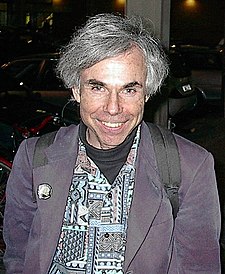Douglas Hofstadter
American physicist, computer scientist and professor of cognitive science
Douglas Hofstadter (born February 15, 1945) is a mathematician, cognitive scientist, and Pulitzer Prize winning author.

Quotes
edit- Irrationality is the square root of all evil.
- "Irrationality is the Square Root of All Evil" (Sep, 1983) Scientific American 249 (3) article reprinted in Metamagical Themas (1985)
- Which statement seems more true: (1) I have a brain. (2) I am a brain.
- The Mind's I with Daniel C. Dennett (1981)
- In fact, a sense of essence is, in essence, the essence of sense, in effect.
- Metamagical Themas (1985)
- The nice thing about having a brain is that one can learn, that ignorance can be supplanted by knowledge, and that small bits of knowledge can gradually pile up into substantial heaps.
- Le Ton beau de Marot (1997) chapter 8 p. 234
- Solomon: Your entry in Wikipedia says that your work has inspired many students to begin careers in computing and artificial intelligence.
Hofstadter: I have no interest in computers. The entry is filled with inaccuracies, and it kind of depresses me.
Solomon: So fix it.
Hofstadter: The next day someone will fix it back.- Quoted in Deborah Solomon, "The Mind Reader," New York Times (2007-04-01)
- If the meanings of true and false were switched, this sentence wouldn't be false.
- I Am a Strange Loop (2007) p. 68
- I am not shooting at immortality through my books, no. Nor do I think Chopin was shooting at immortality through his music. That strikes me as a very selfish goal, and I don't think Chopin was particularly selfish. I would also say that I think that music comes much closer to capturing the essence of a composer's soul than do a writer's ideas capture the writer's soul. Perhaps some very emotional ideas that I express in my books can get across a bit of the essence of my soul to some readers, but I think that Chopin's music probably does a lot better job (and the same holds, of course, for many composers). I personally don't have any thoughts about "shooting for immortality" when I write. I try to write simply in order to get ideas out there that I believe in and find fascinating, because I'd like to let other people be able share those ideas. But intellectual ideas alone, no matter how fascinating they are, are not enough to transmit a soul across brains. Perhaps, as I say, my autobiographical passages — at least some of them — get tiny shards of my soul across to some people. But such autobiographical story-telling is not nearly as effective a means of soul-transmission as is living with someone you love for many years of your lives, and sharing profound life goals with them — that's for sure!
- [1] Originally published, in Hebrew, in the online culture magazine "Haayal Hakore". (September 2007)
- The "Strange Loop" phenomenon occurs whenever, by moving upwards (or downwards) through levels of some hierarchial system, we unexpectedly find ourselves right back where we started.
- "Introduction: A Musico-Logical Offering"
- The proverbial German phenomenon of the verb-at-the-end about which droll tales of absentminded professors who would begin a sentence, ramble on for an entire lecture, and then finish up by rattling off a string of verbs by which their audience, for whom the stack had long since lost its coherence, would be totally nonplussed, are told, is an excellent example of linguistic recursion.
- "Recursive Structures and Processes"
- Perhaps the most concise summary of enlightenment would be: transcending dualism. … Dualism is the conceptual division of the world into categories … human perception is by nature a dualistic phenomenon—which makes the quest for enlightenment an uphill struggle, to say the least.
- Chapter 9: "Mumon and Gödel"
- Relying on words to lead you to the truth is like relying on an incomplete formal system to lead you to the truth. A formal system will give you some truths, but as we shall soon see, a formal system, no matter how powerful—cannot lead to all truths.
- Chapter 9: "Mumon and Gödel"
- Below Every Tangled Hierarchy Lies An Inviolate Level
- Chapter 20: "Strange Loops Or Tangled Hierarchies"
- No reference is truly direct—every reference depends on some kind of coding scheme. It's just a question of how implicit it is.
- "Six-Part Ricercar"
- One of the basic tenets of Zen Buddhism is that there is no way to characterize what Zen is. No matter what verbal space you try to enclose Zen in, it resists, and spills over. It might seem, then, that all efforts to explain Zen are complete wastes of time. But that is not the attitude of Zen masters and students. For instance, Zen koans are a central part of Zen study, verbal though they are. Koans are supposed to be "triggers" which, though they do not contain enough information in themselves to impart enlightenment, may possibly be sufficient to unlock the mechanisms inside one's mind that lead to enlightenment. But in general, the Zen attitude is that words and truth are incompatible, or at least that no words can capture truth.
- This type of paradox is quite characteristic of Zen. It is an attempt to "break the mind of logic".
- This statement refers to a koan
- Hofstadter's Law: It always takes longer than you expect, even when you take into account Hofstadter's Law.
- Reality includes creating every real connection and reference.
External links
edit